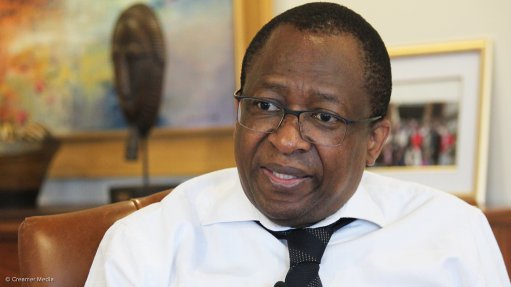
IEC Chief Electoral Officer Sy Mamabolo
Photo by: Creamer Media
The Independent Electoral Commission of South Africa (IEC) is positioning scholarships concerned with electoral processes at the apex of its priorities during its tenure as chairperson of the Association of World Election Bodies.
Chief Electoral Officer Sy Mamabolo noted on Thursday that electoral scholarships were crucial to promote informed decision-making among electoral stakeholders and to facilitate knowledge-based decision-making.
Mamabolo was speaking during the South African Institute of International Affairs media briefing on ‘Safeguarding Election Management Bodies (EMBs) in the Age of Democratic Recession’ as it launched a special issue of the South African Journal of International Affairs.
He highlighted that an electoral scholarship is not a pious enterprise intended to produce knowledge for its own sake, rather it is concerned with developing knowledge to better understand the inherent contradictions that define a country’s current democratic realities.
He said that scholarships help counter misinformation and encourage critical thinking and contribute to the overall health of electoral and democratic processes.
Mamabolo explained that research in the electoral sphere is vital for enhancing efficiency, fairness and ultimately the integrity of electoral processes, because it allows election officials and policy makers to identify and address challenges.
“But also to implement best practices and adapt to evolving threats and technologies. Through research and scholarship election administrators and policy makers can optimise administrative systems of EMBs and voter registration systems - even improve voting station management and performance of voting officials, enhance security measures, and ultimately ensure a more reliable and transparent electoral environment,” he said.
SPECIAL ISSUE JOURNAL
The South African Journal of International Affairs focusing on safeguarding EMBs in the age of democratic recession has been co-written by 13 authors.
“This special publication consists in conceptualising and articulating a coagent theoretical response to democratic recession; it provides a deeper understanding of electoral systems, legislative frameworks, policies and administrative systems by fostering a more knowledgeable cadre of electoral administrators,” said Mamabolo.
He highlighted that the journal issue was a contribution to the building of the body of knowledge within the electoral sphere.
“We hope that it will be a basis upon which further research can be undertaken in an endeavour to build an even greater body of electoral scholarship,” he enthused.
Mamabolo said this special edition was an incisive piece of electoral scholarship and it would remain so beyond South Africa’s tenure leading the institution.
“It is the base that will stay for many years to come because it will record the realities of our current situation in the electoral sphere and will be there for many generations to read and convince them about the right things to do in order to preserve democracy.”
DEMOCRATIC RECESSION
University of East Anglia UK Professor of Politics and Public Policy and School of Policy Studies, and Institute of Intergovernmental Relations at Queens University Distinguished Fellow Toby S. James explained that there was strong evidence that the world had now entered an era of democratic recession, where the quality of democracy was being reversed.
“In this era, the quality of elections is thought to be declining in many countries. While citizens have the opportunity to register and cast their ballot, their democratic rights are being undermined by gerrymandered electoral districts, threats of voter intimidation or violence during the electoral cycle, as well as the disruptive role of the social media and arbitrary State-sanctioned social media shut-downs during elections,” said James.
He explained that although there had also been improvements in election quality in some countries, with indicators not demonstrating an overall decline in election quality globally, electoral integrity had become a vital policy issue around the world.
James said that the future trajectory of democracy was not pre-determined, however, he said it was a story yet to be written and the outcome was contingent on the actions of many actors, organisations, communities and individuals, with EMBs the fulcrum.
He added that it was EMBs that were primarily responsible for implementing the legislative framework regarding electoral competition, voting, counting procedures and processes, as well as the announcement of election results.
EMBs worldwide have also participated in and benefited from international, continental and regional norm-setting initiatives for democratic elections and the introduction of democracy and electoral assistance programmes, in the quest to improve their performance and conduct credible elections.
The existence of normative frameworks aimed at the entrenchment of democratic and participatory governance was at the heart of this norm-setting trend globally.